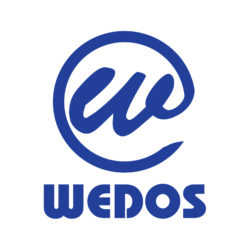After moving our website to a new solution using WordPress, we are often asked why we chose this particular content management system and not something else. We jokingly reply that it’s because WordPress and Wedos start with W.
How it started
Approximately two years ago we first started talking about a new website for WEDOS Internet, a.s.. The current solution that has been with us since the company was founded in 2010 was already outdated. On the one hand, it was our own solution with full control, but we also felt that the complexity and complexity of the system limited us. The whole website was also quite structured with a lot of text and the graphics with optimization for new platforms were far from the current trends. Any change kept us from more important matters.
The second big motivator was the need to separate the marketing department’s dependencies on programmers as much as possible, making WordPress a hot candidate to replace our outdated CMS.
The resistance to any third party product in our country has been great. Huge, to be precise. Only after a year of democratic discussion did we arrive at a final decision that was not “without banging on the table”.
Why WordPress
At the beginning, it is necessary to mention what benefits the WordPress content management system brings not only to us, but to everyone in general. We will then take a closer look at each of the benefits and place them in the context of WEDOS Internet, a.s.
- Active community
- Ease of use
- Managing roles
- Plugins
WordPress is the most widely used content management system in the world using a common core. The widespread familiarity of the code then attracts a plethora of attackers who use this popularity for a variety of purposes ranging from misuse and data theft to fun. The only disadvantage may be, paradoxically, security and security flaws, which we try to minimize.
Active Community
There is a large community around WordPress that provides regular updates, development and translations. There is also a plethora of plugins, templates, etc. For this reason, WordPress is a simple yet powerful and versatile web development tool.
Ease of use
One of the undeniable advantages of a website running on WordPress is the ease of use. Whether it’s the default classic editor, which is currently replaced in the fifth version of WordPress by the promising Gutenberg editor or in our case by the Elementor plugin. Both are simple and intuitive editors.
Even though the new Gutenberg editor has gained new functionalities and is developed directly by the WordPress community, we needed to get more complex content into our site with more settings, which Gutenberg simply won’t allow us to do, or at the time of preparing our site, Gutenberg didn’t allow it. However, it will definitely be an editor that will be sufficient for most users. In our case, we preferred Elementor, even though it is a third-party plugin. The reasons for this were as follows. The paid version of this plugin brings full support from Elementor developers, the latest version with respect to possible security risks, a wide range of options and settings and last but not least, a relatively simple implementation of custom plugins in conjunction with Elementor elements exactly as we need.
We’ve spent a long, long time figuring out the look. You won’t believe how many different templates and editors we’ve tried. One time we couldn’t do this, the other time we couldn’t do that. Sometimes it was slow for clients, other times for administrators. Just a horror movie. We spent an awful lot of time on it and it still wasn’t right. No template was ideal. In the end, we decided to make the site as simple as possible from scratch and Elementor was really the best fit for that. A basic, blank page and we inserted the blocks into it. This way we have put together the page design ourselves and can modify it at any time. The ideal solution. Nothing from other third parties is required.
Managing roles
Another huge advantage is the already functional role management, which we needed with respect to programmers, administrators and editors. It is not desirable for an editor to have the same rights as a Wodpress administrator if he or she is only going to create articles on the site or translate them into the appropriate language. This makes training more efficient, but also eliminates safety risks to some extent.
Plugins
We try to use a minimal number of third-party plugins on our WordPress sites. This is partly for security reasons, because it minimizes the exploitation of bugs in third-party plugins and we have very specific requirements for certain plugins that none of the publicly available plugins cover.
We have made our own plugins and we are able to program any plugin quite easily. We currently use e.g. custom plugin for verifying the availability of domain names on domain registries, for calculating service prices according to our internal price lists or for registering web PUSH notifications.
At the beginning there was a fear that writing plugins would be very difficult, but after writing the first plugin we found out that it’s terribly easy and nothing prevents us from further development.
Security
The security of either WordPress itself, or the danger of depending on a particular plugin developer, or the readiness of our IDS/IPS protection was addressed long before we decided on WordPress.
WordPress came out as the most suitable candidate also in terms of IDS/IPS protection. For several years we have been learning how to filter attacks on your site, which is 75% built on WordPress. Our IDS/IPS protection has therefore a lot of experience with this and every day our IDS/IPS protection downloads information about new vulnerabilities and implements them in its filters. There are many tens of thousands of WordPresses in our country, so we know something about their security.
The security of WordPress itself is largely ensured by the core developers and also by the fact that the whole system is open-source and thanks to a strong community, bugs are found relatively quickly.
As much as possible, we’ve limited ourselves to the core of WordPress, which we customize to our needs. The use of third-party plug-ins exists, but is minimal. And related to this is the problem of dependency on a specific external plugin developer.
For overall WordPress security, we not only use basic things like .htaccess rules, but we also use the options offered by the web hosting administration. For example, blocking all FTP accounts and unblocking them only when necessary or using a different database user with limited rights.
Therefore, we try to solve the security of the application comprehensively and use what we (and you) offer NoLimit web hosting already in the base.
WordPress and NoLimit
All of our language versions of WEDOS websites run on the completely ordinary NoLimit web hosting, or on the upcoming demo version of the WMS (Webhosting Managed Server) service. WEDOS websites are thus operated on the same servers as the websites of our customers who have NoLimit web hosting. There are some customizations, which include, for example, the creation of the web hosting for the subdomain itself, modification of individual parameters including your desired php processes or a dedicated server or part of it. You can look forward to this and much more in WMS. But that’s another article.
Because WordPress and NoLimit simply belong together, we are also preparing a brand new service for you with the provisional name “WB” (WEDOS Builder or Website Builder), which will run on NoLimit web hosting with WordPress support. It will be a so-called webpage builder, where it will be possible to create pages just by filling in text and inserting individual elements directly into the pages. You will not have to worry about installing any editorial system or even programming the site and you can deal with purely content and graphic design. The service will be designed for less demanding clients who want a web business card and do not have knowledge of coding pages or simply do not want to deal with their creation. Everything will be based on WordPress, which we will customize to our exact needs.
Conclusion
Despite the initial reluctance of most of our colleagues, it gradually turns out that WordPress is an excellent solution, fully sufficient for our purposes, with very simple handling and the ability to respond quickly to your suggestions almost in real time. Thanks to the editor, virtually anyone can edit and does not need any training or knowledge. Because we really only use core WordPress with a minimum of plugins and a basic template, we are also able to react much faster to new trends and prepare the site for new markets. This was the case with Slovak, Polish and now even Russian sites. And there are more to come (German, Ukrainian, French, Spanish). We also use WordPress for our blog.wedos.cz and we are working on a suitable WordPress solution for the forum. On blog.wedos.cz we put the most basic template without any further modifications. We argue that appearance is not important, but content is. All this on classic NoLimit hosting. So we ourselves are setting an example.
In the future, we will describe more and more details about the functioning of WordPress at WEDOS, or the use of WordPress for our own website.

